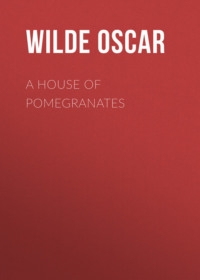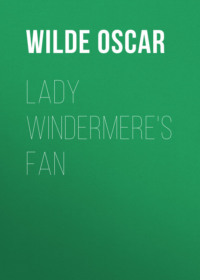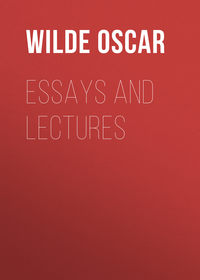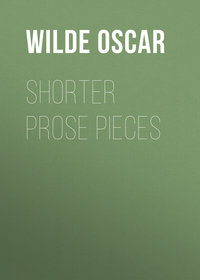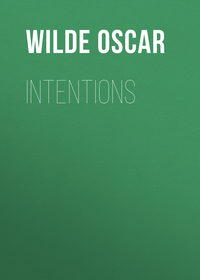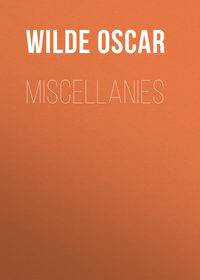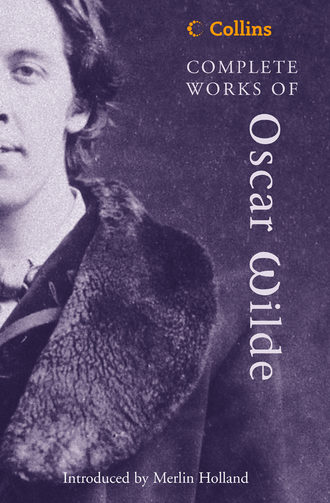
Полная версия
Complete Works of Oscar Wilde
‘No, Harry,’ answered the artist, giving his hat and coat to the bowing waiter. ‘What is it? Nothing about politics, I hope? They don’t interest me. There is hardly a single person in the House of Commons worth painting; though many of them would be the better for a little white-washing.’
‘Dorian Gray is engaged to be married,’ said Lord Henry, watching him as he spoke.
Hallward started, and then frowned. ‘Dorian engaged to be married!’ he cried. ‘Impossible!’
‘It is perfectly true.’
‘To whom?’
‘To some little actress or other.’
‘I can’t believe it. Dorian is far too sensible.’
‘Dorian is far too wise not to do foolish things now and then, my dear Basil.’
‘Marriage is hardly a thing that one can do now and then, Harry.’
‘Except in America,’ rejoined Lord Henry, languidly. ‘But I didn’t say he was married. I said he was engaged to be married. There is a great difference. I have a distinct remembrance of being married, but I have no recollection at all of being engaged. I am inclined to think that I never was engaged.’
‘But think of Dorian’s birth, and position, and wealth. It would be absurd for him to marry so much beneath him.’
‘If you want to make him marry this girl tell him that, Basil. He is sure to do it, then. Whenever a man does a thoroughly stupid thing, it is always from the noblest motives.’
‘I hope the girl is good, Harry. I don’t want to see Dorian tied to some vile creature, who might degrade his nature and ruin his intellect.’
‘Oh, she is better than good – she is beautiful,’ murmured Lord Henry, sipping a glass of vermouth and orange bitters. ‘Dorian says she is beautiful; and he is not often wrong about things of that kind. Your portrait of him has quickened his appreciation of the personal appearance of other people. It has had that excellent effect, amongst others. We are to see her to-night, if that boy doesn’t forget his appointment.’
‘Are you serious?’
‘Quite serious, Basil. I should be miserable if I thought I should ever be more serious than I am at the present moment.’
‘But do you approve of it, Harry?’ asked the painter, walking up and down the room, and biting his lip. ‘You can’t approve of it, possibly. It is some silly infatuation.’
‘I never approve, or disapprove, of anything now. It is an absurd attitude to take towards life. We are not sent into the world to air our moral prejudices. I never take any notice of what common people say, and I never interfere with what charming people do. If a personality fascinates me, whatever mode of expression that personality selects is absolutely delightful to me. Dorian Gray falls in love with a beautiful girl who acts Juliet, and proposes to marry her. Why not? If he wedded Messalina he would be none the less interesting. You know I am not a champion of marriage. The real drawback to marriage is that it makes one unselfish. And unselfish people are colourless. They lack individuality. Still, there are certain temperaments that marriage makes more complex. They retain their egotism, and add to it many other egos. They are forced to have more than one life. They become more highly organised, and to be highly organised is, I should fancy, the object of man’s existence. Besides, every experience is of value, and, whatever one may say against marriage, it is certainly an experience. I hope that Dorian Gray will make this girl his wife, passionately adore her for six months, and then suddenly become fascinated by some one else. He would be a wonderful study.’
‘You don’t mean a single word of all that, Harry; you know you don’t. If Dorian Gray’s life were spoiled, no one would be sorrier than yourself. You are much better than you pretend to be.’
Lord Henry laughed. ‘The reason we all like to think so well of others is that we are all afraid for ourselves. The basis of optimism is sheer terror. We think that we are generous because we credit our neighbour with the possession of those virtues that are likely to be a benefit to us. We praise the banker that we may overdraw our account, and find good qualities in the highwayman in the hope that he may spare our pockets. I mean everything that I have said. I have the greatest contempt for optimism. As for a spoiled life, no life is spoiled but one whose growth is arrested. If you want to mar a nature, you have merely to reform it. As for marriage, of course that would be silly, but there are other and more interesting bonds between men and women. I will certainly encourage them. They have the charm of being fashionable. But here is Dorian himself. He will tell you more than I can.’
‘My dear Harry, my dear Basil, you must both congratulate me!’ said the lad, throwing off his evening cape with its satin-lined wings and shaking each of his friends by the hand in turn. ‘I have never been so happy. Of course it is sudden; all really delightful things are. And yet it seems to me to be the one thing I have been looking for all my life.’ He was flushed with excitement and pleasure, and looked extraordinarily handsome.
‘I hope you will always be very happy, Dorian,’ said Hallward, ‘but I don’t quite forgive you for not having let me know of your engagement. You let Harry know.’
‘And I don’t forgive you for being late for dinner,’ broke in Lord Henry, putting his hand on the lad’s shoulder, and smiling as he spoke. ‘Come, let us sit down and try what the new chef here is like, and then you will tell us how it all came about.’
‘There is really not much to tell,’ cried Dorian, as they took their seats at the small round table. ‘What happened was simply this. After I left you yesterday evening, Harry, I dressed, had some dinner at that little Italian restaurant in Rupert Street you introduced me to, and went down at eight o’clock to the theatre. Sibyl was playing Rosalind. Of course the scenery was dreadful, and the Orlando absurd. But Sibyl! You should have seen her! When she came on in her boy’s clothes she was perfectly wonderful. She wore a moss-coloured velvet jerkin with cinnamon sleeves, slim brown cross-gartered hose, a dainty little green cap with a hawk’s feather caught in a jewel, and a hooded cloak lined with dull red. She had never seemed to me more exquisite. She had all the delicate grace of that Tanagra figurine that you have in your studio, Basil. Her hair clustered round her face like dark leaves round a pale rose. As for her acting – well, you shall see her to-night. She is simply a born artist. I sat in the dingy box absolutely enthralled. I forgot that I was in London, and in the nineteenth century. I was away with my love in a forest that no man had ever seen. After the performance was over I went behind, and spoke to her. As we were sitting together, suddenly there came into her eyes a look that I had never seen there before. My lips moved towards hers. We kissed each other. I can’t describe to you what I felt at that moment. It seemed to me that all my life had been narrowed to one perfect point of rose-coloured joy. She trembled all over, and shook like a white narcissus. Then she flung herself on her knees and kissed my hands. I feel that I should not tell you all this, but I can’t help it. Of course our engagement is a dead secret. She has not even told her own mother. I don’t know what my guardians will say. Lord Radley is sure to be furious. I don’t care. I shall be of age in less than a year, and then I can do what I like. I have been right, Basil, haven’t I, to take my love out of poetry, and to find my wife in Shakespeare’s plays? Lips that Shakespeare taught to speak have whispered their secret in my ear. I have had the arms of Rosalind around me, and kissed Juliet on the mouth.’
‘Yes, Dorian, I suppose you were right,’ said Hallward, slowly.
‘Have you seen her to-day?’ asked Lord Henry.
Dorian Gray shook his head. ‘I left her in the forest of Arden, I shall find her in an orchard in Verona.’
Lord Henry sipped his champagne in a meditative manner. ‘At what particular point did you mention the word marriage, Dorian? And what did she say in answer? Perhaps you forgot all about it.’
‘My dear Harry, I did not treat it as a business transaction, and I did not make any formal proposal. I told her that I loved her, and she said she was not worthy to be my wife. Not worthy! Why, the whole world is nothing to me compared with her.’
‘Women are wonderfully practical,’ murmured Lord Henry – ‘much more practical than we are. In situations of that kind we often forget to say anything about marriage, and they always remind us.’
Hallward laid his hand upon his arm. ‘Don’t, Harry. You have annoyed Dorian. He is not like other men. He would never bring misery upon any one. His nature is too fine for that.’
Lord Henry looked across the table. ‘Dorian is never annoyed with me,’ he answered. ‘I asked the question for the best reason possible, for the only reason, indeed, that excuses one for asking any question – simply curiosity. I have a theory that it is always the women who propose to us, and not we who propose to the women. Except, of course, in middle-class life. But then the middle classes are not modern.’
Dorian Gray laughed and tossed his head. ‘You are quite incorrigible, Harry; but I don’t mind. It is impossible to be angry with you. When you see Sibyl Vane you will feel that the man who could wrong her would be a beast, a beast without a heart. I cannot understand how any one can wish to shame the thing he loves. I love Sibyl Vane. I want to place her on a pedestal of gold, and to see the world worship the woman who is mine. What is marriage? An irrevocable vow. You mock at it for that. Ah! don’t mock. It is an irrevocable vow that I want to take. Her trust makes me faithful, her belief makes me good. When I am with her, I regret all that you have taught me. I become different from what you have known me to be. I am changed, and the mere touch of Sibyl Vane’s hand makes me forget you and all your wrong, fascinating, poisonous, delightful theories.’
‘And those are…?’ asked Lord Henry, helping himself to some salad.
‘Oh, your theories about life, your theories about love, your theories about pleasure. All your theories, in fact, Harry.’
‘Pleasure is the only thing worth having a theory about,’ he answered, in his slow, melodious voice. ‘But I am afraid I cannot claim my theory as my own. It belongs to Nature, not to me. Pleasure is Nature’s test, her sign of approval. When we are happy we are always good, but when we are good we are not always happy.’
‘Ah! but what do you mean by good?’ cried Basil Hallward.
‘Yes,’ echoed Dorian, leaning back in his chair, and looking at Lord Henry over the heavy clusters of purple-lipped irises that stood in the centre of the table, ‘what do you mean by good, Harry?’
‘To be good is to be in harmony with one’s self,’ he replied, touching the thin stem of his glass with his pale, fine-pointed fingers. ‘Discord is to be forced to be in harmony with others. One’s own life – that is the important thing. As for the lives of one’s neighbours, if one wishes to be a prig or a Puritan, one can flaunt one’s moral views about them, but they are not one’s concern. Besides, Individualism has really the higher aim. Modern morality consists in accepting the standard of one’s age. I consider that for any man of culture to accept the standard of his age is a form of the grossest immorality.’
‘But, surely, if one lives merely for one’s self, Harry, one pays a terrible price for doing so?’ suggested the painter.
‘Yes, we are overcharged for everything nowadays. I should fancy that the real tragedy of the poor is that they can afford nothing but self-denial. Beautiful sins, like beautiful things, are the privilege of the rich.’
‘One has to pay in other ways but money.’
‘What sort of ways, Basil?’
‘Oh! I should fancy in remorse, in suffering, in…well, in the consciousness of degradation.’
Lord Henry shrugged his shoulders. ‘My dear fellow, mediæval art is charming, but mediaeval emotions are out of date. One can use them in fiction, of course. But then the only things that one can use in fiction are the things that one has ceased to use in fact. Believe me, no civilised man ever regrets a pleasure, and no uncivilised man ever knows what a pleasure is.’
‘I know what pleasure is,’ cried Dorian Gray. ‘It is to adore some one.’
‘That is certainly better than being adored,’ he answered, toying with some fruits. ‘Being adored is a nuisance. Women treat us just as Humanity treats its gods. They worship us, and are always bothering us to do something for them.’
‘I should have said that whatever they ask for they had first given to us,’ murmured the lad, gravely. ‘They create Love in our natures. They have a right to demand it back.’
‘That is quite true, Dorian,’ cried Hallward.
‘Nothing is ever quite true,’ said Lord Henry.
‘This is,’ interrupted Dorian. ‘You must admit, Harry, that women give to men the very gold of their lives.’
‘Possibly,’ he sighed, ‘but they invariably want it back in such very small change. That is the worry. Women, as some witty Frenchman once put it, inspire us with the desire to do masterpieces, and always prevent us from carrying them out.’
‘Harry, you are dreadful! I don’t know why I like you so much.’
‘You will always like me, Dorian,’ he replied. ‘Will you have some coffee, you fellows? – Waiter, bring coffee, and fine-champagne, and some cigarettes. No: don’t mind the cigarettes; I have some. Basil, I can’t allow you to smoke cigars. You must have a cigarette. A cigarette is the perfect type of a perfect pleasure. It is exquisite, and it leaves one unsatisfied. What more can one want? Yes, Dorian, you will always be fond of me. I represent to you all the sins you have never had the courage to commit.’
‘What nonsense you talk, Harry!’ cried the lad, taking a light from a firebreathing silver dragon that the waiter had placed on the table. ‘Let us go down to the theatre. When Sibyl comes on the stage you will have a new ideal of life. She will represent something to you that you have never known.’
‘I have known everything,’ said Lord Henry, with a tired look in his eyes, ‘but I am always ready for a new emotion. I am afraid, however, that, for me at any rate, there is no such thing. Still, your wonderful girl may thrill me. I love acting. It is so much more real than life. Let us go. Dorian, you will come with me. I am so sorry, Basil, but there is only room for two in the brougham. You must follow us in a hansom.’
They got up and put on their coats, sipping their coffee standing. The painter was silent and preoccupied. There was a gloom over him. He could not bear this marriage, and yet it seemed to him to be better than many other things that might have happened. After a few minutes they all passed downstairs. He drove off by himself, as had been arranged, and watched the flashing lights of the little brougham in front of him. A strange sense of loss came over him. He felt that Dorian Gray would never again be to him all that he had been in the past. Life had come between them…His eyes darkened, and the crowded, flaring streets became blurred to his eyes. When the cab drew up at the theatre, it seemed to him that he had grown years older.
7
FOR some reason or other, the house was crowded that night, and the fat Jew manager who met them at the door was beaming from ear to ear with an oily, tremulous smile. He escorted them to their box with a sort of pompous humility, waving his fat jewelled hands, and talking at the top of his voice. Dorian Gray loathed him more than ever. He felt as if he had come to look for Miranda and had been met by Caliban. Lord Henry, upon the other hand, rather liked him. At least he declared he did, and insisted on shaking him by the hand, and assuring him that he was proud to meet a man who had discovered a real genius and gone bankrupt over a poet. Hallward amused himself with watching the faces in the pit. The heat was terribly oppressive, and the huge sunlight flamed like a monstrous dahlia with petals of yellow fire. The youths in the gallery had taken off their coats and waistcoats and hung them over the side. They talked to each other across the theatre, and shared their oranges with the tawdry girls who sat beside them. Some women were laughing in the pit. Their voices were horribly shrill and discordant. The sound of the popping of corks came from the bar.
‘What a place to find one’s divinity in!’ said Lord Henry.
‘Yes!’ answered Dorian Gray. ‘It was here I found her, and she is divine beyond all living things. When she acts you will forget everything. These common, rough people, with their coarse faces and brutal gestures, become quite different when she is on the stage. They sit silently and watch her. They weep and laugh as she wills them to do. She makes them as responsive as a violin. She spiritualises them, and one feels that they are of the same flesh and blood as one’s self.’
‘The same flesh and blood as one’s self! Oh, I hope not!’ exclaimed Lord Henry, who was scanning the occupants of the gallery through his opera-glass.
‘Don’t pay any attention to him, Dorian,’ said the painter. ‘I understand what you mean, and I believe in this girl. Any one you love must be marvellous, and any girl that has the effect you describe must be fine and noble. To spiritualise one’s age – that is something worth doing. If this girl can give a soul to those who have lived without one, if she can create the sense of beauty in people whose lives have been sordid and ugly, if she can strip them of their selfishness and lend them tears for sorrows that are not their own, she is worthy of all your adoration, worthy of the adoration of the world. This marriage is quite right. I did not think so at first, but I admit it now. The gods made Sibyl Vane for you. Without her you would have been incomplete.’
‘Thanks, Basil,’ answered Dorian Gray, pressing his hand. ‘I knew that you would understand me. Harry is so cynical, he terrifies me. But here is the orchestra. It is quite dreadful, but it only lasts for about five minutes. Then the curtain rises, and you will see the girl to whom I am going to give all my life, to whom I have given everything that is good in me.’
A quarter of an hour afterwards, amidst an extraordinary turmoil of applause, Sibyl Vane stepped on to the stage. Yes, she was certainly lovely to look at – one of the loveliest creatures, Lord Henry thought, that he had ever seen. There was something of the fawn in her shy grace and startled eyes. A faint blush, like the shadow of a rose in a mirror of silver, came to her cheeks as she glanced at the crowded, enthusiastic house. She stepped back a few paces, and her lips seemed to tremble. Basil Hallward leaped to his feet and began to applaud. Motionless, and as one in a dream, sat Dorian Gray, gazing at her. Lord Henry peered through his glasses, murmuring, ‘Charming! Charming!’
The scene was the hall of Capulet’s house, and Romeo in his pilgrim’s dress had entered with Mercutio and his other friends. The band, such as it was, struck up a few bars of music, and the dance began.
Through the crowd of ungainly, shabbily dressed actors, Sibyl Vane moved like a creature from a finer world. Her body swayed, while she danced, as a plant sways in the water. The curves of her throat were the curves of a white lily. Her hands seemed to be made of cool ivory.
Yet she was curiously listless. She showed no sign of joy when her eyes rested on Romeo. The few words she had to speak—
‘Good pilgrim, you do wrong your hand too much,
Which mannerly devotion shows in this;
For saints have hands that pilgrim’s hands do touch,
And palm to palm is holy palmers’ kiss –’
with the brief dialogue that follows, were spoken in a thoroughly artificial manner. The voice was exquisite, but from the point of view of tone it was absolutely false. It was wrong in colour. It took away all the life from the verse. It made the passion unreal.
Dorian Gray grew pale as he watched her. He was puzzled and anxious. Neither of his friends dared to say anything to him. She seemed to them to be absolutely incompetent. They were horribly disappointed.
Yet they felt that the true test of any Juliet is the balcony scene of the second act. They waited for that. If she failed there, there was nothing in her.
She looked charming as she came out in the moonlight. That could not be denied. But the staginess of her acting was unbearable, and grew worse as she went on. Her gestures became absurdly artificial. She over-emphasised everything that she had to say. The beautiful passage –
‘Thou knowest the mask of night is on my face,
Else would a maiden blush bepaint my cheek
For that which thou hast heard me speak to-night –’
was declaimed with the painful precision of a schoolgirl who has been taught to recite by some second-rate professor of elocution. When she leaned over the balcony and came to those wonderful lines –
‘Although I joy in thee,
I have no joy of this contract to-night:
It is too rash, too unadvised, too sudden;
Too like the lightning, which doth cease to be
Ere one can say, “It lightens.” Sweet, good-night!
This bud of love by summer’s ripening breath
May prove a beauteous flower when next we meet –’
She spoke the words as though they conveyed no meaning to her. It was not nervousness. Indeed, so far from being nervous, she was absolutely selfcontained. It was simply bad art. She was a complete failure.
Even the common, uneducated audience of the pit and gallery lost their interest in the play. They got restless, and began to talk loudly and to whistle. The Jew manager, who was standing at the back of the dress-circle, stamped and swore with rage. The only person unmoved was the girl herself.
When the second act was over there came a storm of hisses, and Lord Henry got up from his chair and put on his coat. ‘She is quite beautiful, Dorian,’ he said, ‘but she can’t act. Let us go.’
‘I am going to see the play through,’ answered the lad, in a hard, bitter voice. ‘I am awfully sorry that I have made you waste an evening, Harry. I apologise to you both.’
‘My dear Dorian, I should think Miss Vane was ill,’ interrupted Hallward. ‘We will come some other night.’
‘I wish she were ill,’ he rejoined. ‘But she seems to me to be simply callous and cold. She has entirely altered. Last night she was a great artist. This evening she is merely a commonplace, mediocre actress.’
‘Don’t talk like that about any one you love, Dorian. Love is a more wonderful thing than Art.’
‘They are both simply forms of imitation,’ remarked Lord Henry. ‘But do let us go. Dorian, you must not stay here any longer. It is not good for one’s morals to see bad acting. Besides, I don’t suppose you will want your wife to act. So what does it matter if she plays Juliet like a wooden doll? She is very lovely, and if she knows as little about life as she does about acting, she will be a delightful experience. There are only two kinds of people who are really fascinating – people who know absolutely everything, and people who know absolutely nothing. Good heavens, my dear boy, don’t look so tragic! The secret of remaining young is never to have an emotion that is unbecoming. Come to the club with Basil and myself. We will smoke cigarettes and drink to the beauty of Sibyl Vane. She is beautiful. What more can you want?’
‘Go away, Harry,’ cried the lad. ‘I want to be alone. Basil, you must go. Ah! Can’t you see that my heart is breaking?’ The hot tears came to his eyes. His lips trembled, and, rushing to the back of the box, he leaned up against the wall, hiding his face in his hands.
‘Let us go, Basil,’ said Lord Henry, with a strange tenderness in his voice; and the two young men passed out together.
A few moments afterwards the footlights flared up, and the curtain rose on the third act. Dorian Gray went back to his seat. He looked pale, and proud, and indifferent. The play dragged on, and seemed interminable. Half of the audience went out, tramping in heavy boots, and laughing. The whole thing was a fiasco. The last act was played to almost empty benches. The curtain went down on a titter, and some groans.


